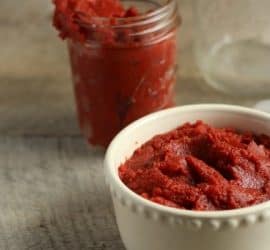Homemade Fermented Ketchup Recipe

- Yield: 1 pint 1x
- Category: Condiment
Ingredients
- 2 (6oz) cans of tomato paste OR 1.5 cups homemade tomato paste (like this)
- 3 tablespoons maple syrup or raw honey
- 3 tablespoons raw vinegar (I used my homemade vinegar, but this is a great option to purchase)
- 2 tablespoons whey or brine from existing vegetable ferments*
- 1/4 teaspoon onion powder
- 1/2 teaspoon sea salt (I use this one)
- 1/8 teaspoon black pepper
- 1/8 teaspoon allspice
Instructions
- *If you are wanting the beneficial probiotics in fermented ketchup, the whey/brine cannot be omitted. Here’s how to make real whey (powdered whey will NOT work), or just skim some brine from an existing ferment. I used my sauerkraut brine, and it worked beautifully.
- Combine all the ingredients, tasting and adjusting the seasonings as needed.
- Place the ketchup in a pint-sized mason jar, and fit with an airlock or regular lid.
- Allow the homemade ketchup to sit out at room temperature for 2-3 days. If you are using a regular lid, you’ll probably need to “burp” the ketchup every day or so to prevent a build up of gases. If you are using an airlock, you don’t have to worry about it.
- Move the ketchup to the refrigerator for another three days.
- Enjoy on homemade burgers, homemade hash browns, or my favorite– french fries fried in beef tallow.
- Long-Term Storage: Fermented ketchup should last 3-6 months in your fridge. I haven’t tried freezing it, but considering how well other tomato products freeze, I imagine it would work just fine.
- You could technically can it if you wanted, but the high temps of the canning process would kill all the beneficial bacteria, so you might as well not ferment it in the first place then.